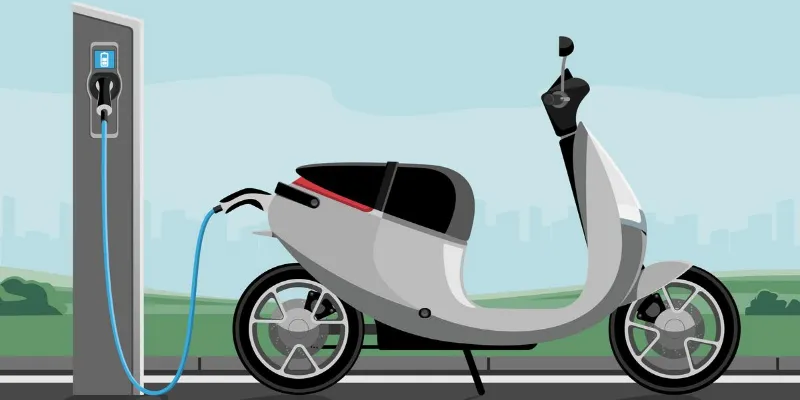Inspired by entrepreneurs, this law graduate started a Li-ion battery pack business; clocks Rs 3.8Cr annually
Vibhhas Verma’s desire to do something “futuristic” led him to start Aqueouss in 2016 — a Delhi-based lithium-ion battery pack manufacturer — that caters to EV, solar, etc., sectors, clocking Rs 3.8 crore annually.
Vibhhas Verma was pursuing law at Amity University, Noida, when he started reading a lot of business books by entrepreneurs who built multi-core businesses. These stories of success, failure, and perseverance besotted him. Even though his path was set in the field of law, these books changed something within him.
Not just that; he was also inspired by his father Pradeep Verma, who has been running a high-pressure die casting business for almost 45 years. However, Vibhhas decided not to pursue his family business rather start something of his own. In his words, “he wanted to do something futuristic.”
He was inspired by the batteries industry. In fact, one of his friends pointed out the hype around lithium-ion batteries, thanks to its wide-spread adoption in the electric vehicle industry.
Apart from that, these batteries are used across solar, consumer electronics, robotics, defence, and railway, among other industries.
The idea clicked, and in 2016, he started Aqueouss, a lithium-ion batteries trading business, in the third year of his college. He pursued the degree and ran the business side by side until his graduation in 2018.
From trading to manufacturing
Vibhhas rented out a room in West Delhi and was the only person working in the company. He deliberately took a place away from his father’s office so he could work from scratch and get a better hang of the business operations, he claims.
In 2018, the company shifted from trading lithium-ion batteries to manufacturing lithium-ion battery packs.
“Initially, we were short on capital, so we stuck to trading. But now, we have our own assembling unit for making the battery packs,” Vibhhas Verma, Founder of Aqueouss, tells SMBStory.
Today, the company manufactures lithium-ion (Li-ion) and lithium-iron-phosphate (LiFePO4) battery packs for EV vehicles and the solar industry. Vibhhas says different battery packs require different sets of cells depending on the sector it will be used.
For example, a solar battery pack requires two cells, and in some cases, 60 cells. An EV battery pack has as many as 400 cells, and are priced from Rs 13,000.
Vibhhas says the LiFePO4 is in some ways safer than Li-ion as it doesn’t heat up and burst into flames as quickly as the latter.
Since its inception, the company has now grown from one person to more than ten employees. Last year, Aqueouss clocked Rs 3.8 crore annual turnover.
Riding on India’s EV wave
In the 1900s, when Henry Ford launched the Ford Motor Company, the cars manufactured and the methods used in manufacturing, significantly altered the world’s automobile ecosystem. Vibhhas believes the EV sector is on the same path.
India is a burgeoning market for EVs. According to the Society of Manufacturers of Electric Vehicles (SMEV), the sales of electric two-wheelers in India grew by 20 percent at 1.56 lakh units sold in 2019-20.
Additionally, the Indian government has been taking steps, including the implementation of FAME I and FAME II policies, to ensure India doesn’t lag in the global EV market. However, Vibhhas believes, there is a lot of room for growth.
Aqueouss imports its raw materials, especially the lithium-ion cells from China. He says, “China is way ahead of India, and even the US. They started manufacturing lithium-ion batteries some 10-15 years ago, and realised the scope of this industry much faster and before anyone.”
Although India can produce other raw materials required for Li-ion battery pack manufacturing, the country still depends on China for the main raw material (lithium-ion cells).
Aqueouss assembles the imported lithium-ion cells in India and develops battery packs out of them as per the customer’s need. The brand doesn’t trade in EV batteries anymore and is entirely focussed on establishing itself as an EV brand.
The company’s manufacturing unit is located in Delhi. The business also provides contract manufacturing services for certain clients.

Winning with customisation
Vibhhas says Aqueouss is a brand that fully dedicates itself to cater to the needs of its customers. The B2B company counts Ahmedabad-based Photonics Watertech, Coimbatore-based Clancor Technovates, robotics toys company Building Blocks, among others in its clientele.
The company regularly deliberates with its clients on the product design of the battery packs and makes the required changes, if any. Vibhhas also claims to test every lithium-ion cell when it reaches India from China. Segregating the working and the non-working cells help the company increase the efficiency of the final battery pack.
At present, Aqueouss makes battery packs only for the electric two-wheelers segment, including electric cycles, scooters, bikes, etc.
Going forward, it is also planning to dive into the three-wheeler segment. In fact, it is also developing strategies to tie-up with fleet operators of e-rickshaws and autos in Delhi-NCR.
Learnings, and the way forward
Aqueouss is witnessing a steady growth, but Vibhhas wants the business to “grow faster” by focusing on better-quality products “delivered” to its customers.
“In any business, human capital is the most important. This is something I have learnt from my father,” says Vibhhas.
He wants to grow the business by taking all the stakeholders of the company together. Vibhhas adds that the one principle he learnt from his father and has stood by is to work with as few people as possible.
However, he ensures his employees are committed to the company, hold expertise in their respective fields, and are in tandem with his vision for the company.
Going forward, Vibhhas is focussed on raising capital that will help Aqueouss cater to the needs of the EV sector. He is also in the process of building a team to set up a battery management system within the company that will enhance its manufacturing capabilities.
Edited by Suman Singh









